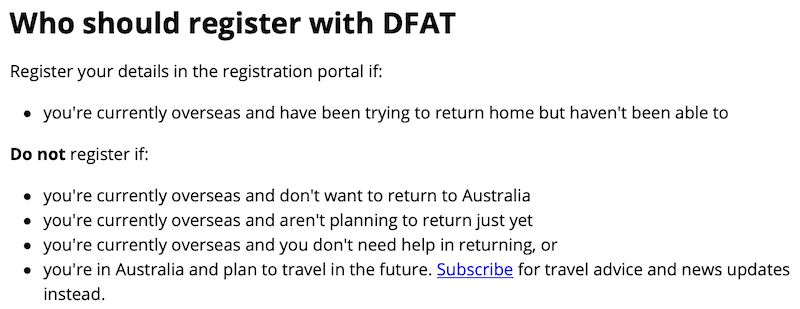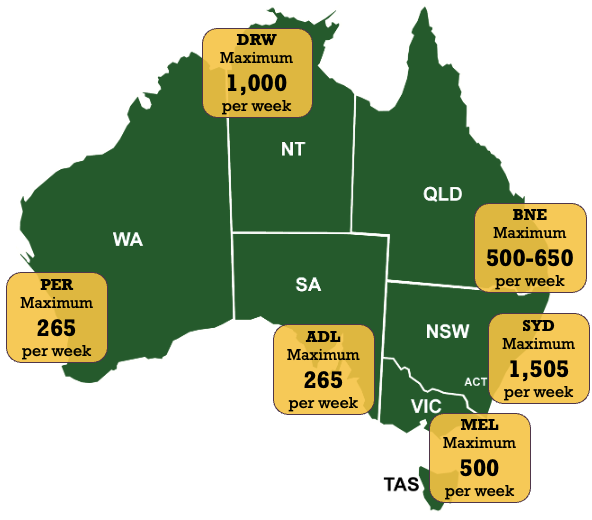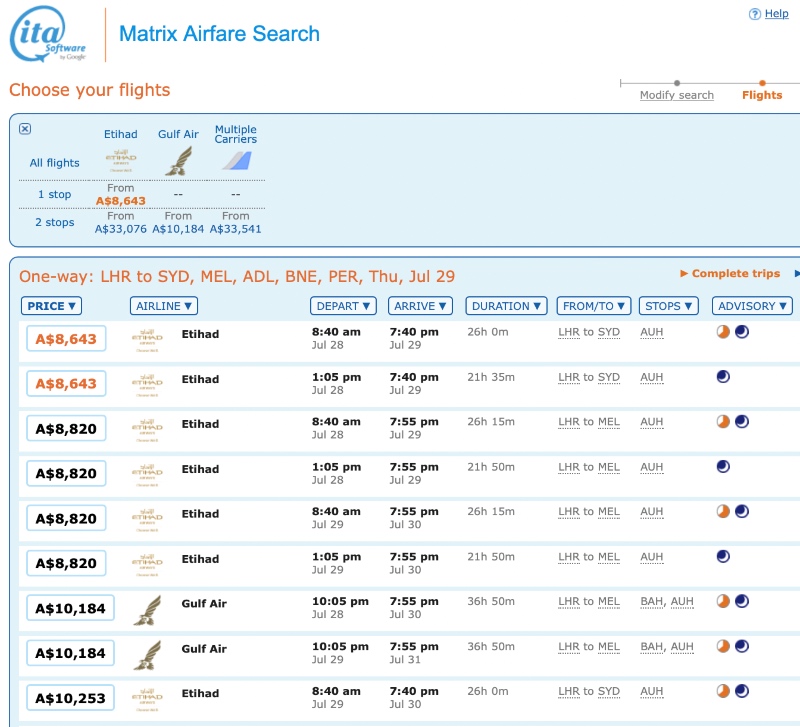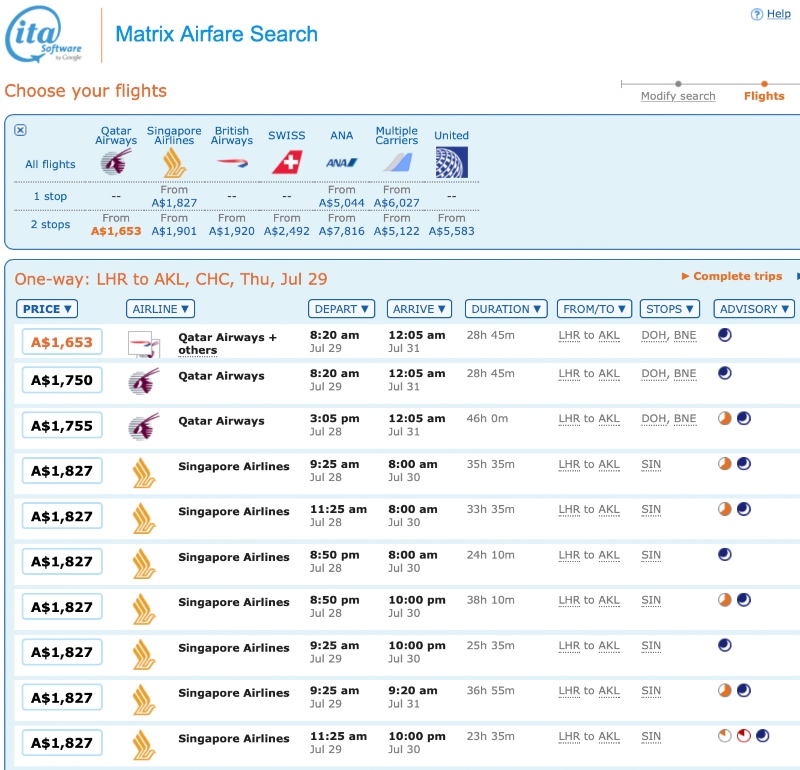There is No Queue to Return to Australia During COVID-19

Last week, the Australian government halved the cap on the number of people allowed to return to Australia each week. For tens of thousands of Australians still stranded overseas, this will have disastrous consequences.
Following the announcement last Friday, Facebook groups for Australians stranded overseas were flooded with posts by stressed Aussies who now face homelessness because their tickets back to Australia have been cancelled. Some have already sold or ended leases on their houses, quit jobs, sold cars and even withdrawn their children from schools, as they thought they would be returning to Australia. They’re now stuck in a state of indefinite limbo.
These are just some of the many tens of thousands of Australians who still remain stranded overseas, more than a year into the COVID-19 pandemic, through little fault of their own.
Some Australians may offer little sympathy, blaming expats and others stuck abroad for not returning home sooner. But a large number of those Australian citizens and permanent residents have already been trying for many months to buy a ticket home. Tens of thousands haven’t been able to return yet because the system is broken. Or, more to the point, there isn’t really a system at all.
How many Australians are actually stranded overseas?
In November 2020, the Department of Foreign Affairs & Trade (DFAT) revealed that 36,875 Australians were registered as being stranded overseas. Four months later, in March 2021, the government quoted the number of Australians stuck overseas as “over 36,000”. Now, in July 2021, the number is apparently around 34,000.
This is the number that most of the media reports as representing the number of Australians currently overseas. But it’s a gross underestimate. The true number is far higher, as this is merely the most recent number of people quoted by the government as being registered with DFAT.
Many Australians who are intending to return home have not yet registered with DFAT because the government itself is advising those who have already booked commercial flights not to register.
Furthermore, the DFAT registration process is only available to Australian citizens and permanent residents. Their immediate family members and anyone else with an exemption to travel for a legitimate reason are also entitled to come to Australia, and last month made up 16.1% of people arriving in Australia. But they cannot register with DFAT and therefore aren’t being counted in the government’s artificially low numbers.
This is what the government’s own guidelines say about registering with DFAT:

Based on recent BITRE data and the current arrival caps, we would estimate that around 170,000 people have arrived in Australia (excluding from New Zealand on quarantine-free flights) since the beginning of December 2020. So, how is it possible that the number of overseas Australians registered with DFAT has only dropped by less than 3,000 in the same period?
Clearly, either these numbers do not represent the actual number of Australians trying to return, or the most vulnerable Australians (that’s why they’re registered with DFAT) have been left behind. It’s probably a combination of both.
International arrival caps are too low
With so many people trying to return to Australia, the government’s restrictive arrival caps were already far too low before National Cabinet agreed last week to halve them until at least the end of August 2021 (and possibly until next year). There are now just 3,035 hotel quarantine spaces available in the major cities to house returning Australians and other exempted travellers each week.
There is an additional “surge capacity” capable of taking up to 150 more people each week in Queensland. And the Howard Springs facility near Darwin, which mainly handles passengers arriving on DFAT charter flights, now has a capacity of around 2,000 people per fortnight.

But that’s still not nearly enough capacity, despite the government’s attempts to reduce pressure on the hotel quarantine system by banning outbound travel. (Australia is one of only a very small handful of countries, including North Korea, which currently bans its own residents from leaving the country.)
The federal government says that it will increase the number of DFAT repatriation flights to Darwin in the coming months, to compensate for the reduction of available seats on commercial flights. This will not even come close to bridging the gap.
Recent proposals to build new quarantine facilities are welcome, but these will probably not be available until next year. That’s little help to the tens of thousands of Australians trying to come home now.
So, who decides which Australians get a seat on a flight home?
This brings us to the crux of the problem.
The airlines are only allowed to sell a small number of seats on each flight. For example, a typical international flight into Melbourne at the moment may have as few as 27 passengers. That’s before the 50% arrival cap reduction takes effect from 14 July!
Ultimately, the airlines have the final say on who they will carry to Australia. Airlines are businesses, so it’s no surprise that they generally prioritise the passengers who’ve paid the most money for their tickets.
If you can afford to pay $15,000 for a one-way First Class ticket to Australia, you’ll likely have little trouble getting back within the next few months. If you book a full-fare Premium Economy or Economy class ticket to somewhere like Adelaide or Brisbane, your chances of being accepted onto the flight may also be higher. But flights with “cheaper” tickets back to Australia (which are still expensive by pre-covid standards) may not be available for many months. And if you risk booking a cheaper Economy class ticket, there is a high probability you’ll be bumped off the flight – even if you have a confirmed ticket.
Many Australians have already booked multiple flights, only to be repeatedly and unceremoniously bumped at the last minute without being offered an alternative flight. To make matters worse, this often happens with such little notice that they’ve already paid $200 to get a pre-flight COVID-19 test within 72 hours of when they thought they would be departing.
Once this happens, travellers have to start the process of booking a ticket to Australia all over again. It would be like getting sent to the back of the queue again… if there was one.
Sadly, the people who can least afford to pay top dollar for a full-priced ticket are the people in the most vulnerable situations who most need to get home. With the arrival caps now being further reduced, those most vulnerable are the ones being sent once again to the back of the non-existent queue, as those who can afford $10,000+ one-way airfares buy up whatever seats are left.
Some people have become so desperate that they’ve resorted to setting up “Go Fund Me” pages to pay for Business class tickets, as they couldn’t see any other way to get home without getting bumped. Other Australian citizens have joked about trying to come back to Australia on a boat instead, as that might be easier than getting on a plane.
For some vulnerable Australians, this cycle of booking flights and having their tickets cancelled has already gone on for almost a year. There is simply no queue to return to Australia. And that’s a huge problem.
DFAT repatriation flights
In addition to commercial flights, DFAT and Qantas have organised some repatriation charter flights on an ad-hoc basis. Passengers on these flights still have to pay for their tickets, and they aren’t cheap, but at least they are another option.
There’s no doubt that these DFAT flights have helped many Australians. But tickets for some of these flights have sold out in just minutes, and these flights are often announced at such short notice that Australians don’t have enough time to take advantage of them. Does the government really think that Australian expats are sitting at home 24/7 with their bags packed, ready to hand back the keys of their houses and go to the airport at a moment’s notice?
New Zealand’s “managed isolation & quarantine” (MIQ) system
New Zealand’s hotel quarantine system is similar to Australia’s. But there are a few key differences.
The main difference is how places in “MIQ”, as it’s known, are booked. New Zealand citizens and permanent residents can easily check when the next spots are available, and book an allocation voucher at no cost. After booking their isolation for a specific arrival date, Kiwis can then book a plane ticket in the knowledge they will be able to travel on the date they have booked. Vouchers are released in batches to ensure everyone gets fair access to them.
Not only does the MIQ system provide more certainty for travellers, but airfares back to New Zealand are also much cheaper than ticket prices into Australia. That’s because the airlines have no incentive to price gouge – they aren’t limited in the number of seats they can sell to New Zealand, and passengers have a genuine choice of airlines. Once you have a confirmed MIQ booking, there is no reason for an airline to bump you just because you bought a cheap ticket.
For example, if you needed to travel from London to anywhere in Australia at the end of this month, an ITA Matrix search shows that the cheapest available ticket is currently AU$8,643. Seats on most airlines except Etihad Airways are already sold out completely.

The same search for flights from London to Auckland or Christchurch reveals plenty of options on Qatar Airways or Singapore Airlines, with prices from just AU$1,653.

That’s not the only difference between the Australian and New Zealand hotel quarantine systems. In New Zealand, for example, people in isolation are allowed out of their rooms periodically, in a controlled way, for fresh air and exercise.
New Zealand also runs its hotel quarantine system so that everyone staying at a given hotel arrives at roughly the same time, completes their 14 days of isolation together, then leaves on the same day. This prevents a COVID-positive traveller arriving at a hotel and inadvertently infecting another traveller who is about to leave quarantine.
Admittedly, New Zealand’s quarantine system is not perfect either. Depending on when you look, the next available quarantine spot could be several months away. There’s also a problem with people booking multiple vouchers for themselves, taking up spots that could be reserved by others.
But more spots do become available closer to the time as the NZ government releases more batches and people with existing vouchers change their plans. There is also an emergency allocation kept aside for people who genuinely need to travel to New Zealand urgently.
Most importantly, New Zealand offers certainty to its citizens about when they will be able to get home, allowing them to plan their lives accordingly. There is a queue, and the system is fundamentally fair.
By comparison, Australia’s system (or lack of one) is fundamentally broken and has failed countless of Australian citizens now wondering if they’ll ever be able to call their own country home again.


